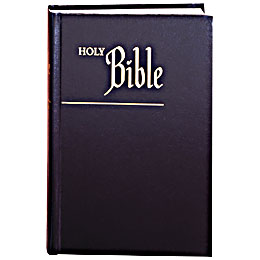The Apocrypha: An Evangelical Catholic Perspective[1]
Canon Glenn E. Davis
Overview
The Morning Star of the Reformation, John Wycliffe, voiced in the fourteenth century a love for scripture that Evangelicals embrace today:
Christian men and women, old and young, should study well in the New Testament, for it is of full authority, and open to understanding by simple men, as to the points that are most needful to salvation. Each part of Scripture (i. e. Old and New Testaments), both open and dark, teaches meekness and charity; and therefore he that keeps meekness and charity has the true understanding and perfection of all Scripture. Therefore, no simple man of wit should be afraid to study in the text of Scripture.[2]
For Evangelicals there is nothing more important than God’s word for in it is found “the infallible rule of faith and practice.”[3] However, Evangelicals disagree with Roman Catholics and Eastern Orthodox as to exactly what books make up the canon-or the official list of books of scripture. This debate began in second century A. D. and magnified in significance during the Reformation. This disagreement persists to this day between Protestants, Roman Catholics and Orthodox, raising passions and intense theological debate concerning the nature of inspiration, the authority of the church, and the weight of Tradition. This dispute concerns the “Apocrypha,” a collection of fourteen or fifteen books (or parts of books) not included in the Masoretic text of the Hebrew Bible, but translated in the Greek version of the Hebrew Bible called the Septuagint (LXX). These books were written during the last two centuries before Christ and the first century of the Christian era. The following are the titles of these books as given in the Revised Standard Version (1957):
1. The First Book of Esdras
2. The Second Book of Esdras
3. Tobit
4. Judith
5. The Additions to the Book of Esther
6. The Wisdom of Solomon
7. Ecclesiasticus, or the Wisdom of Jesus the Son of Sirach
8. Baruch
9. The Letter of Jeremiah
10. The Prayer of Azariah and the Song of the Three Young Men
11. Susanna
12. Bel and the Dragon
13. The Prayer of Manasseh
14. The First Book of the Maccabees
15. The Second Book of the Maccabees
Three theological convictions dominate the discussion of the merits or deficiencies of including the Apocrypha as canon of Scripture. The Anglican Thirty-Nine Articles state that the Apocryphal books are not Holy Spirit inspired, but are instructional.[4] The Evangelical position is that they are not Holy Spirit inspired but are useful only for historical study.[5] The Roman Catholic Church considers them as the inspired Word of God.[6] This essay will explore the early disagreements and focus on the Evangelical opposition to the inclusion of the Apocrypha.
Read the entire essay here: the-apocrypha-an-evangelical-catholic-perspective-blog-version.
Canon Glenn E. Davis
Canon Theologian, Southeast Province, CEC
[3] “The Lausanne Covenant,” Article Two, The Authority and Power of the Bible (The Lausanne Committee for World Evangelization website); available from http://www.lausanne.org/Brix?pageID=12891.
[4] Thirty-Nine Articles of Religion, Article Six, (The 1662 Book of Common Prayer website); available from http://www.eskimo.com/~lhowell/bcp1662/articles/articles.html#6 “And the other books (as Hierome saith) the Church doth read for example of life and instruction of manners; but yet doth it not apply them to establish any doctrine.”
[5] Westminster Confession of Faith, Chapter One, Article III (The Center for Reformed Theology and Apologetics website); available from http://www.reformed.org/documents/wcf_with_proofs/ . “The books commonly called Apocrypha, not being of divine inspiration, are no part of the canon of the Scripture, and therefore are of no authority in the Church of God, nor to be any otherwise approved, or made use of, than other human writings.”
[6] Catechism of the Catholic Church, Second Edition, Paragraph 120 (Saint Charles Borromeo Catholic Church website); available from http://www.scborromeo.org/ccc/p1s1c2a3.htm#120.

